(4) Gender and Inclusive Society
A. Promotion of Women’s Empowerment and Participation
The social norms and systems in developing countries are generally shaped by men’s perspectives, which leave women in vulnerable positions in many aspects. On the other hand, women are critical actors in each country’s development, and their participation leads not only to the improvement of their own lives but also to increasing the impact of the development. For example, improving the literacy of women who have had few or no educational opportunities so far increases their access to correct information on public health and prevention of infectious diseases such as HIV/AIDS, and on appropriate family planning, leading to women’s social advancement and economic empowerment. Moreover, it contributes to the sustainable and inclusive economic growth of developing countries.
The “2030 Agenda for Sustainable Development (2030 Agenda)” strongly and clearly addresses that “Realizing gender equality and the empowerment of women and girls will make a crucial contribution to progress across all the Goals and targets.” In concrete terms, SDG 5 seeks to “Achieve gender equality and empower all women and girls.” Gender equality and promoting women’s empowerment are essential for realizing “quality growth.” For this purpose, it is important that men and women participate equally in all phases of development cooperation and reap the benefits equitably.
● Japan’s Efforts
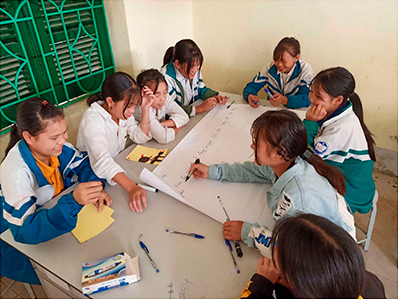
Female students of a children’s club exchanging opinions on the prevention of human trafficking under the project on “Human Trafficking Prevention for Women and Girls in Dien Bien Province” in mountainous areas of Viet Nam (Photo: World Vision Japan)
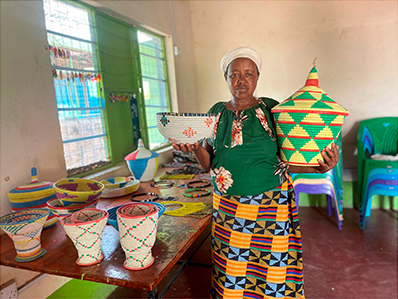
A woman with baskets produced through the “Project for Enhancing Women’s Resilience in Refugee Camps and Host Communities” in Kenya, with the aim of increasing women’s cash income and achieving economic independence (Photo: UN Women)
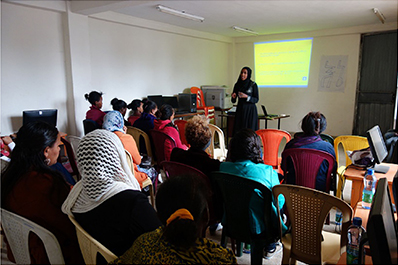
The “Women Entrepreneurship Development Project” providing training to women who aim to start a business in Ethiopia (Photo: JICA)
In the “Development Strategy for Gender Equality and Women’s Empowerment,” Note 67 Japan set the following three basic principles: (i) promoting women’s and girls’ rights, (ii) building the capacity of women and girls to reach their full potentials, and (iii) advancing women’s leadership in political, economic, and other public fields. Based on this strategy, Japan advances its efforts in the international community to promote gender mainstreaming, Note 68 gender equality, and women’s and girls’ empowerment.
In 2018, Japan contributed 50 million US dollars to the Women Entrepreneurs Finance Initiative (We-Fi). Note 69 As of June 2022, Japan has supported 50,068 women-owned/led small and medium enterprises (WSMEs) in 59 countries. Specifically, 40,378 WSMEs have received financial assistance while 13,885 received training to acquire the skills and knowledge necessary for management. According to the World Bank, 70% of WSMEs in developing countries are unable to receive financing from financial institutions or are faced with poor borrowing terms. In response to such a situation, through We-Fi, Japan promotes the development of legal systems free from gender discrimination and supports women entrepreneurs in having equal access to financing and markets.
At the G7 Elmau Summit held in June 2022, the G7 Leaders’ Communiqué affirmed their commitment to make every effort to collectively increase the share of G7’s bilateral allocable ODA advancing gender equality and women’s and girls’ empowerment over the coming years.
In December 2022, Japan held the World Assembly for Women: WAW! 2022, with the main theme “Mainstreaming Gender into a New Form of Capitalism.” Looking ahead to discussions under the G7 Presidency of Japan in 2023, the following five sub-themes were set: (i) New Form of Capitalism and Women, (ii) Realizing a Society Protecting Women’s Dignity and Pride, (iii) Enhancing Awareness and Engagement of Men; (iv) Women’s Participation in Decision-Making Processes, and (v) Women’s Participation in Peace and Security. Along with the themes, leaders and experts active in various fields in Japan and overseas exchanged opinions on how to create a better society. In addition, Japan designated the period before and after WAW! 2022 as “WAW! Weeks,” and registered 107 side events in promotion of gender equality and women’s empowerment, which are the aims of WAW!.
Japan also provides support through UN Women and contributed approximately 21 million US dollars in 2021 and 14 million US dollars in 2022 for promoting political participation and economic empowerment of women, eliminating sexual and gender-based violence against women and girls, improving women’s role in the peace and security fields, and strengthening gender-responsive policies and budgets. Furthermore, in 2022, Japan continued to contribute to the prevention of COVID-19 with gender perspectives in Africa and Asia. For example, in Somalia, Japan supported 2,234 women with regard to COVID-19 prevention measures. In South Sudan, Japan supported 13,189 internally displaced persons and host community residents in improving their knowledge of COVID-19, including the importance of vaccinations, and of gender-based violence that was on the rise as COVID-19 spread.
Japan considers sexual violence in conflict cannot be tolerated. Therefore, Japan places importance on collaboration with the UN Office of the Special Representative of the Secretary-General on Sexual Violence in Conflict (OSRSG-SVC). Note 70 Amid the spread of COVID-19 in 2022, Japan contributed approximately 517,000 US dollars to the OSRSG-SVC to provide legal assistance to victims of sexual violence in the Democratic Republic of the Congo while taking measures against COVID-19 infections.
Japan also contributed an additional 2 million euros in 2022 to the Global Survivors Fund (GSF), Glossary making it a total of 6 million euros in contributions so far. Japan, as its board member, actively contributes to supporting survivors of conflict-related sexual violence in conflict-affected areas, including the Democratic Republic of Congo and Iraq. In July 2022, on the occasion of the 50th regular session of the UN Human Rights Council, Japan co-hosted a side event on reparations for survivors of conflict-related sexual violence in Ukraine with GSF and its board members (France, the United Kingdom, and the Republic of Korea), the United States, Ukraine, and others. In September of the same year, on the occasion of the UN General Assembly, Japan once again co-hosted a side event on supporting survivors with GSF, its board members, the United States, Canada, and Ukraine. At the WAW! 2022 held in December, Dr. Mukwege, one of the founders of GSF, participated online.
Japan formulated its National Action Plan in 2015 for the implementation of UN Security Council resolution 1325 on Women, Peace and Security (WPS) adopted in 2000 and other relevant resolutions, in order to support women in conflict-affected and fragile countries through international organizations and bilateral assistance. In terms of the G7 framework, under the G7 WPS Note 71 Partnership Initiative (2018), Japan has assisted its partner country of Sri Lanka since 2019. Japan provides assistance for the formulation of its WPS Action Plan and for women’s financial empowerment, including for the households of widows who are left behind after the 26-year internal conflict, as a project for the implementation of the country’s Action Plan. The livelihood support provided by this partnership is appreciated by the Government of Sri Lanka as a catalyst for economic recovery as well as a contribution to peace building and reconstruction in the region.
B. Assistance for People who Tend to be in Vulnerable Situations
Challenges such as poverty, conflicts, infectious diseases, terrorism, and natural disasters have varying impacts depending on the situations that individuals are in, including their country and region, or whether they are women and/or children. In addition, the spread of COVID-19 has had a major impact particularly on the survival and livelihoods of all people placed in socially vulnerable positions. The concept of human security, which focuses on the protection and empowerment of each individual, is thus indispensable for the realization of a society that fulfills the principle of the SDGs, “no one will be left behind.”
● Japan’s Efforts
■ Assistance for Persons with Disabilities
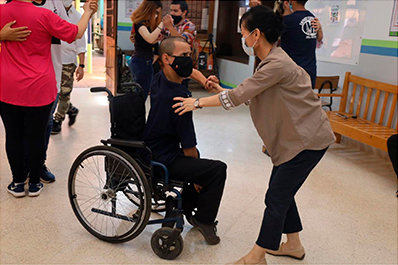
A JICA expert practicing tango therapy for persons with disabilities as part of technical cooperation in Paraguay (Photo: JICA)
In order to ensure the social participation and inclusion of people in vulnerable situations in society, especially persons with disabilities, Japan’s ODA pays due attention to their situations, including persons with disabilities. Article 32 of the Convention on the Rights of Persons with Disabilities Note 72 stipulates that States Parties would undertake measures for international cooperation and its promotion.
Policies for persons with disabilities cover a number of different areas, such as welfare, health and medical care, education, and employment. Japan applies its accumulated expertise and experiences in these areas to support developing countries in implementing measures and policies on disability through ODA and NGO activities (see also “Project Introduction Column”).
For example, Japan takes a thorough hands-on approach to suit various local needs, such as by incorporating accessible design in the planning of railroad and airport construction, developing vocational training centers and rehabilitation facilities (for people with disabilities), and providing minibuses as transportation for persons with disabilities. Additionally, Japan provides a wide range of technical cooperation through JICA to enhance the capacity of organizations and personnel engaged in assisting persons with disabilities. These efforts include acceptance of trainees from developing countries and dispatch of JOCVs and experts such as physical and occupational therapists as well as social workers.
■ Assistance for Children
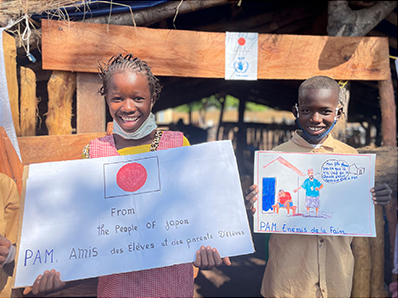
Children in Guinea expressing their gratitude with hand-made plates and pictures for school meal support from Japan (Photo: WFP)
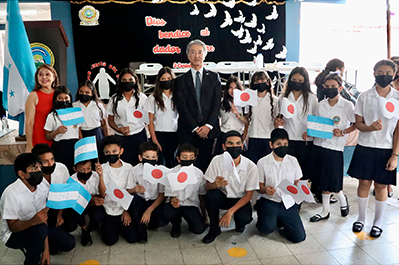
Handover ceremony for the expanded and renovated basic education school and kindergarten through the “Project for Improvement of Two Educational Facilities in Tegucigalpa City” in Honduras
Generally, children tend to be in vulnerable situations. Today, there are many children around the world placed in harsh environments due to the impact of COVID-19 in addition to conflicts, natural disasters, etc., and the number of child refugees and internally displaced children is rapidly increasing. In response to this situation, Japan provides a variety of humanitarian and development assistance for children bilaterally and through international organizations. In 2022, through the United Nations Children’s Fund (UNICEF), Japan provided assistance for children being affected by poverty, conflict, natural disasters, COVID-19, and other factors in 59 countries mainly in Asia, the Middle East, and Africa.
As for the Grant Assistance for Grass-Roots Human Security Projects, Note 73 Japan provides cooperation that directly benefits residents at the grassroots level. Under this scheme, Japan implements projects that contribute to improving the living conditions of children, such as the construction and refurbishment of elementary and junior high schools, provision of medical equipment to hospitals, and development of wells and water supply facilities.
For example, in the Philippines, Japan currently provides cooperation for the construction of a school building for junior secondary education at Datu Igwas Indigenous People Integrated School. The school is located in Kidapawan City in North Cotabato Province, and the students have no other choice but to take classes in simple temporary classrooms, as the school building collapsed due to a strong earthquake. It is expected that this assistance will provide a safe and appropriate learning environment and improve the quality of basic education. In Armenia, Japan provided cooperation for the construction of a playground and exercise area at a village school for children at compulsory education stage in the village of Margahovit in Lori Province. The project is expected to contribute to the healthy growth and development of the body and mind of the children attending the school and other children in the vicinity, as well as to strengthen their athletic abilities and health maintenance.
Mongolia
Developing “Job Coaches” who Connect Persons with Disabilities and Companies
Project for Promoting Employment of Persons with Disabilities (DPUB2)
Technical Cooperation Project (February 2021 – January 2025)
The Government of Mongolia, which ratified the Convention on the Rights of Persons with Disabilities in 2009, promotes measures to ensure the rights of persons with disabilities and their participation in society, including enacting the Rights of Persons with Disabilities Act in 2016. As one of the measures to support the economic and social independence of persons with disabilities, the government obliges companies to employ persons with disabilities under the labor law, and makes efforts to implement the Employment Promotion Program for Persons with Disabilities. On the other hand, companies’ level of understanding regarding the employment of persons with disabilities remains low, and a working environment that responds to their characteristics and needs has not been developed, which poses a challenge.
In light of this, JICA, in cooperation with the Ministry of Labor and Social Protection of Mongolia, makes initiatives to develop specialized human resources called “job coaches.” Job coaches provide services such as matching companies with persons with disabilities and supporting their adaptation to the workplace, toward the realization of their entering the workforce. In this project, so far, four introductory seminars have been held for officials of government agencies, employment support organizations, and private companies, to develop job coaches. For nurturing job coaches, in addition to delivering lectures on the basic concepts and services of job coaches, the project is making efforts such as group work in which seminar participants act as job coaches and learn skills for negotiating with companies regarding the employment of persons with disabilities and teaching work to persons with intellectual disabilities. Participants commented, “I am satisfied to learn detailed and useful knowledge regarding the employment of persons with disabilities.” In July 2022, the project started providing employment support services by job coaches, and so far, 48 people with disabilities have actually used them.
Through this project, guidelines for the subsidy system and a human resources development system were established. In the future, it is expected that the employment of persons with disabilities will be further promoted by creating a system for continuously providing employment support services by job coaches and promoting corporate awareness.
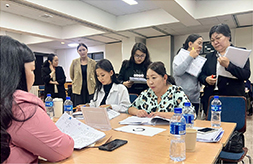
Staff of an employment support organization and an instructor engaging in group work at a job coach introduction seminar (Photo: JICA)
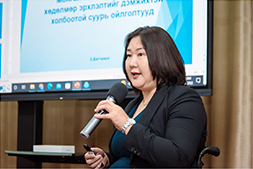
Corporate awareness raising seminar for enhancing the understanding of disabilities (Photo: JICA)
- Note 67: Thematic policies formulated in 2016 to promote the active participation of women in development cooperation.
- Note 68: Integrating a gender perspective into all policies, measures, and projects in order to achieve gender equality in every field. In the field of development, it refers to the process of clarifying development challenges, needs, and impacts on both men and women, at every stage of planning, implementation, monitoring, and evaluation, of all development policies, measures, and projects, based on the premise that they have different impacts on men and women.
- Note 69: The launch of We-Fi was announced at the G20 Hamburg Summit in 2017. By assisting women entrepreneurs and WSMEs in developing countries to overcome various obstacles they face such as access to finance and legal systems and regulations, this initiative aims to promote the prompt economic independence of women in developing countries and their social and economic participation, and to realize regional stability, reconstruction, and peacebuilding.
- Note 70: See also MOFA’s website (https://www.mofa.go.jp/fp/hr_ha/page23e_000466.html) for Japan’s efforts regarding the prevention of sexual violence in conflict.
- Note 71: G7 WPS is an abbreviation for G7 Women, Peace and Security.
- Note 72: Japan ratified the Convention in 2014.
- Note 73: Details of the program and past achievements can be found on MOFA’s website (https://www.mofa.go.jp/mofaj/gaiko/oda/files/000071826.pdf).
